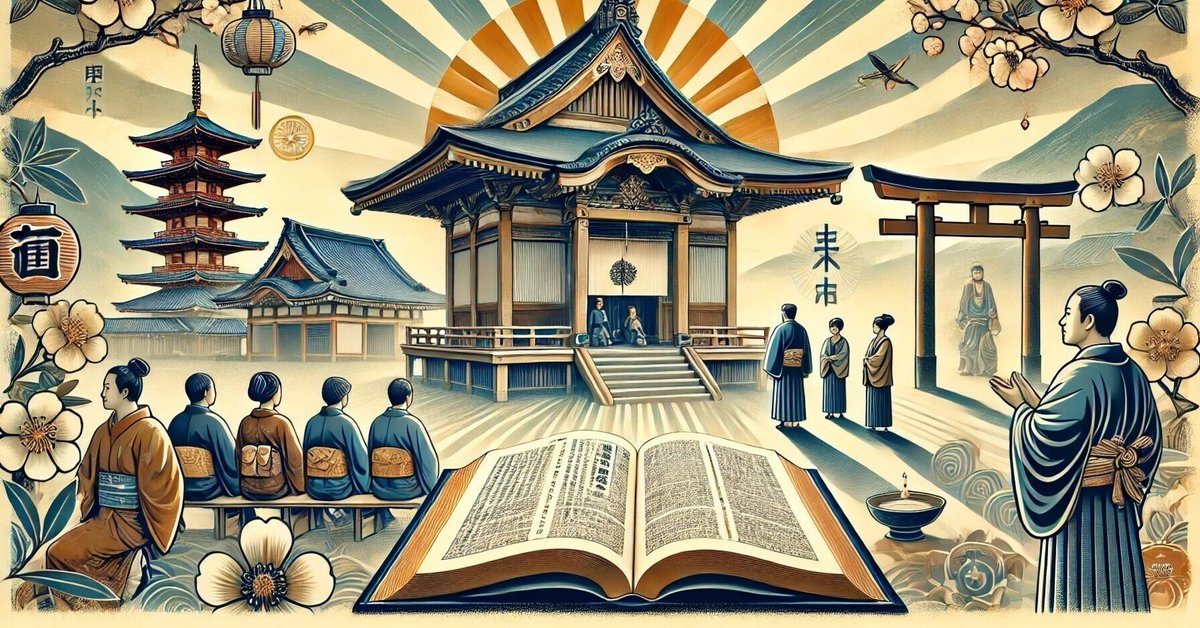
信仰と文化:日本の宗教観を理解する
日本は宗教と霊性に関して独特の関係を持っており、文化的な伝統、古代の信念、そして現代の価値観が混ざり合っています。こうした宗教観を理解することは、日本において信仰の話題に取り組む際に非常に重要です。多くの日本人は自分の宗教的な背景や信仰の原則を深く理解していないことが多く、代わりに漠然とした霊性や文化的なアイデンティティを持っていることが少なくありません。それが、世界や神についての見方に大きな影響を与えています。
1. 文化的アイデンティティとしての宗教
日本において宗教は、文化的な慣習や国家的なアイデンティティと結びついており、信仰そのものとは異なるものと見なされることが多いです。多くの日本人にとって、神社や寺を訪れることは、特定の神や仏に仕える行為というよりも、伝統的な行事や家族の習慣の一部として捉えられています。これらの訪問は、正月の初詣や結婚式、葬式といった人生の節目の一部であり、象徴的な価値を持ちますが、信仰の深い理解や献身を意味するものではありません。
例えば、正月の初詣では、多くの日本人が神社に訪れ、健康や成功、幸福を祈ります。しかし、これらの祈りは、個人的な信仰の表現というよりも、文化的な儀式として行われることが多いのです。このような視点から見ると、宗教は日本において文化的・社会的なアイデンティティの一部として位置づけられ、信仰や宗教の真理について深く探求することはあまり一般的ではありません。
2. 信仰のない霊性
日本の宗教観のユニークな特徴のひとつは、「信仰のない霊性」が存在することです。多くの日本人は、何かしらの高次の存在や未知の力の存在を認識していますが、それを特定の神や組織宗教に結びつけることはほとんどありません。例えば、「お日さま」という言葉は、太陽を神格化したわけではないものの、自然や宇宙に対する一般的な畏敬の念を象徴するものです。これは、多くの日本人が心の中に漠然とした霊性を抱いていることを示しています。
また、瞑想や自然への敬意、先祖を敬うことを通して霊性を表現する人も多くいます。しかし、彼らはそれを特定の宗教や教義と結びつけて考えることはありません。このような霊的意識は日本文化に深く根付いていますが、明確な個人の信仰や神との関係には結びつかないことが多いのです。
3. 物質主義と現代の価値観の影響
現代の日本においては、物質主義や成功の追求が霊的な問題よりも優先されることが多くなっています。勤勉さ、成果、社会的な調和を重視する風潮の中で、多くの人々は外面的な成功を追求し、内面的な平安を得ることが後回しにされることがあります。そのため、霊性や信仰は、キャリアや社会的地位を優先する人々にとっては二の次、あるいは不要とされることさえあります。
しかし、自己啓発や個人の成長、健康やウェルネスに対する関心が高まるにつれ、霊的な側面を含む自己改善への関心も同時に増えています。しかし、これらの探求はしばしば個人的なバランスを求めるものであり、高次の存在や真理を求めることとは異なる方向に向かいがちです。このように、現代の価値観と伝統的な霊性が混ざり合い、日本における信仰の話題は非常に複雑なものとなっています。
4. イエス・キリストを通して道を見出す
日本の信仰と文化の複雑さにもかかわらず、神との個人的な関係を求める必要性は今も変わりません。聖書は、真の信仰がイエス・キリストのうちにあることを教えています。「わたしは道であり、真理であり、命である。わたしを通してでなければ、だれも父のみもとに行くことはできない」(ヨハネ14:6, 口語訳)。日本の文化では、個々の信仰や信念を強く主張することは避けられることが多く、個人の信仰を伝えることは難しいこともあります。
しかし、日本の人々が調和、敬意、そして深い意味を求める姿勢を尊重しながら、イエスのメッセージを伝えることができます。イエスは文化的な慣習や伝統を超えて、すべての人々の心に届く個人的な関係を提供してくださいます。イエスの愛と犠牲を通して、真理を探し求めるすべての人に対して手を差し伸べてくださるのです。
5. 理解を求める人々への励まし
仏教や神道の背景を持つ人々にとって、イエスが神であることを理解することは、人生を一変させる体験となり得ます。私自身も、仏教の家系に生まれ育ち、幼少期にイエスの幻を見ましたが、そのときはイエスがどのような方であるのか理解できませんでした。宣教師たちと出会い、聖書を学ぶまで、イエスが救い主であり、神ご自身であることを理解することができなかったのです。
この理解は私の人生を完全に変えましたし、真理を求めるすべての人にとっても同じことが言えます。イエスは単なる歴史上の人物や霊的指導者ではなく、私たち一人一人と個人的な関係を持ちたいと願っておられる生ける神です。日本において信仰の旅は複雑かもしれませんが、イエス・キリストの真理は明確さ、平安、そして永遠の希望をもたらしてくれます。
Faith and Culture: Understanding Japanese Views on Religion
Japan has a unique relationship with religion and spirituality that often blends cultural traditions, ancient beliefs, and modern attitudes. Understanding these views is essential when approaching the topic of faith in Japan, especially as many Japanese people may not have a deep understanding of their own religious background or specific faith principles. Instead, many hold a more general sense of spirituality and cultural identity that influences their view of the world and the divine.
1. Religion as a Cultural Identity
In Japan, religion is often intertwined with cultural practices and national identity rather than seen as a separate and defined faith. For many, visiting Shinto shrines or Buddhist temples is more about tradition, seasonal celebrations, and family heritage than about devotion to a particular deity. These visits are part of life events like New Year’s prayers, weddings, and funerals. They hold a symbolic value but don’t necessarily translate to a commitment to the tenets of the faith.
For example, during New Year’s celebrations, millions of Japanese visit shrines to pray for health, success, and good fortune. However, these prayers are often viewed as cultural rituals rather than personal expressions of faith. This perspective can create a sense of detachment from understanding deeper religious truths.
2. Spirituality without Faith
One of the unique aspects of Japanese religious views is the presence of spirituality without defined faith. There is a recognition of a higher power or an unknown force, often referred to as "Ohisama" or the Sun, which symbolizes a general sense of reverence for the natural world and the universe. However, this doesn’t necessarily translate to a belief in a personal God or organized religion.
Many Japanese people express their spirituality through practices like meditation, respect for nature, and honoring ancestors, but they may not identify with a specific religion or doctrine. This spiritual awareness is deeply ingrained in the culture but lacks a clear connection to a personal faith or relationship with God.
3. The Role of Materialism and Modern Values
In modern Japan, materialism and the pursuit of success often take precedence over spiritual matters. The emphasis on hard work, achievement, and social harmony can lead many to focus on external success rather than internal peace. As a result, spirituality may be considered secondary or even unnecessary for those who prioritize career and social standing.
At the same time, there is a growing interest in self-improvement, personal development, and wellness, which includes elements of spirituality. However, these pursuits are often more about achieving personal balance rather than seeking the truth of a higher power. This combination of modern values and traditional spirituality creates a complex landscape for discussing faith in Japan.
4. Finding the Way through Jesus Christ
Despite the complexities of faith and culture in Japan, the need for a personal connection with God remains. The Bible teaches us that true faith is found in Jesus Christ, who said, “I am the way, the truth, and the life: no man cometh unto the Father, but by me” (John 14:6, KJV). Introducing people to the message of Jesus can be challenging in a culture that values collective harmony and avoids direct confrontation on personal beliefs.
Yet, there is an opportunity to share His love and truth by connecting with the Japanese people’s appreciation for harmony, respect, and seeking deeper meaning in life. Jesus offers a personal relationship with God, which goes beyond cultural practices and traditions. Through His love and sacrifice, He reaches out to the hearts of those who are searching for truth.
5. Encouragement for Those Seeking Understanding
For those who come from a Buddhist or Shinto background, like myself, understanding Jesus’ role as God can be a transformative experience. Growing up in a Buddhist family, I didn’t fully understand what faith in Jesus meant. I was drawn to Him through visions and experiences, but it wasn’t until I met missionaries and studied the Bible that I understood Jesus as the Savior and God Himself.
This understanding changed everything for me, and it can change everything for anyone who seeks the truth. Jesus is not just a historical figure or a spiritual leader; He is the living God who desires a personal relationship with each of us. The journey to faith in Japan may be complex, but the truth of Jesus Christ brings clarity, peace, and eternal hope.
いいなと思ったら応援しよう!

